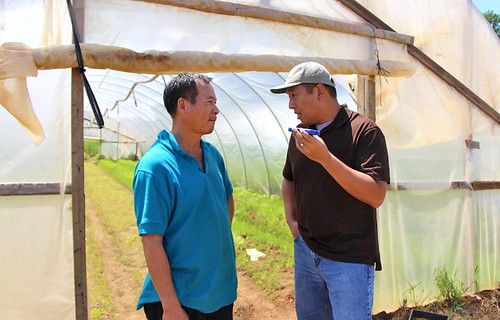
Disasters create pain. And recovery from disasters creates partnerships and opportunity.
That is the lesson Liang Shao Hua learned in the past year after Tropical Storm Sandy, also known as Super Storm Sandy, destroyed his New Jersey high-tunnel farming operation and left him wondering how to manage his loss.
Liang, a Chinese American with very limited English proficiency, relied first on his American-born son, Peter, a 21-year-old college student studying at John Jay College of Criminal Justice, New York. Peter obtained USDA paperwork from the Farm Service Agency (FSA) that helped his father apply for Emergency Conservation Program (ECP) funds. He, his brother, David, 19, and mother, Pei Yin, joined Liang in the clean-up efforts.
Liang Shao Hua was among 315 successful applicants for ECP, one-third from New Jersey. The applicants stretched from West Virginia to New Hampshire. That was the wide swath where Sandy and her trailing cold front left a path of destruction to Atlantic Coast and New England farms.
Congress authorizes ECP funds to assist farmers and ranchers with removal of debris. Funds can be used to do tasks like repair fences. The objective is to return the land that has been damaged by a natural disaster to normal productive use.
Liang began farming his New Jersey acreage in 2009. After immigrating to the United States in 1987, Liang had tried his hand in the restaurant, clothing and local trucking industries. He said a friend told him to look into farming, so he did. He bought land and began to grow vegetables.
His 54-acre farm in Mercer County, 60 miles southwest of New York City, did well in the summer. He grew traditional Asia vegetables – bitter melon, Chinese long beans, greens and various choy sum, also known as Chinese flowering cabbage.
Liang said through an interpreter that he enjoys farming because “I’m my own boss.”
He chose to expand his growing season in 2012. He erected 20 high tunnels to heat, water and protect his seedlings so he could produce well into cooler outdoor temperatures. The high tunnels went up two months before Sandy hit.
Once the storm struck, Liang needed help. FSA came to his aid. So did others with more than financial assistance. Natural Resources Conservation Service (NRCS) New Jersey Partner Employee Frank Wu appeared with multiple skills. One of which was the ability to speak Mandarin Chinese. He also provided technical counsel.
Among the FSA staff called on to take a lead role was Matthew Pavone, a Farm Loan Specialist. Pavone began processing an emergency loan, a low-interest rate credit tool made available when the Secretary of Agriculture declares a county a natural disaster area. Coincidentally, Pavone is married to an Asian American, although he says she was adopted by an Italian American family, so “she’s more Italian than I am.” Still, her birth heritage drew both of them to study and appreciate the Asian culture. Pavone and Liang related well.
The other FSA knights in shining armor were Monmouth County Executive Director Gabor (Gabi) Grunstein and Program Technician Beth Pine. Grunstein and Pine set up the cost-share ECP to help the Liang family clean up Sandy’s mess.
The storm ripped apart the new high tunnels, folded aluminum piping, snapped wood braces and irrigation water lines, and threw nearby trees into the structures. Clean-up was laborious, but it got done.
With FSA’s loan funds in hand, Liang quickly rebuilt his high-tunnel operation for this season’s production. His voice radiates excitement when speaking. He is clearly much happier in 2013 than he was a year earlier. He knows who to thank: Pavone, Grunstein, Pine and Wu, among others as USDA.
New Jersey FSA State Executive Director Paul Hlubik said the experience was a significant breakthrough for the department as well. Liang was a typical small-farm producer handicapped by his language barrier. That put Liang in a category that the department recognizes as an important contributor to the overall farm economy, but one needing special assistance. Liang’s limited ability to know about the services available from his adoptive national government calls for extraordinary outreach to assist him and farmers like Liang.
Hlubik asserts that Liang’s son, Peter, was clearly one who helped his father become aware of opportunities because of the young man’s schooling. Now that his father understands one of USDA’s roles in assisting agricultural producers, he may become a valued customer for life.
Liang says he’s eager to expand his operation, buy more land and grow more vegetables. He said the Asian market is growing. Hlubik and Pavone say the grocery stores and chains like H-Mart appreciate operations like Liang’s. The New Jersey farmland is perfectly located to easily serve markets and restaurants from New York City to Philadelphia.
No natural disaster is welcomed, but it did open up new opportunities for Liang Shao Hua. He discovered new partners and new ways of doing business through USDA. Meanwhile, USDA discovered a new customer who produces a highly valued crop.
Does he fear future storms? Liang says, “weather doesn’t matter; it’s going to happen. What matters is to keep moving forward.”
